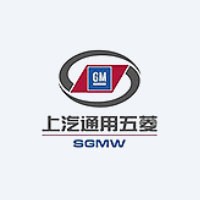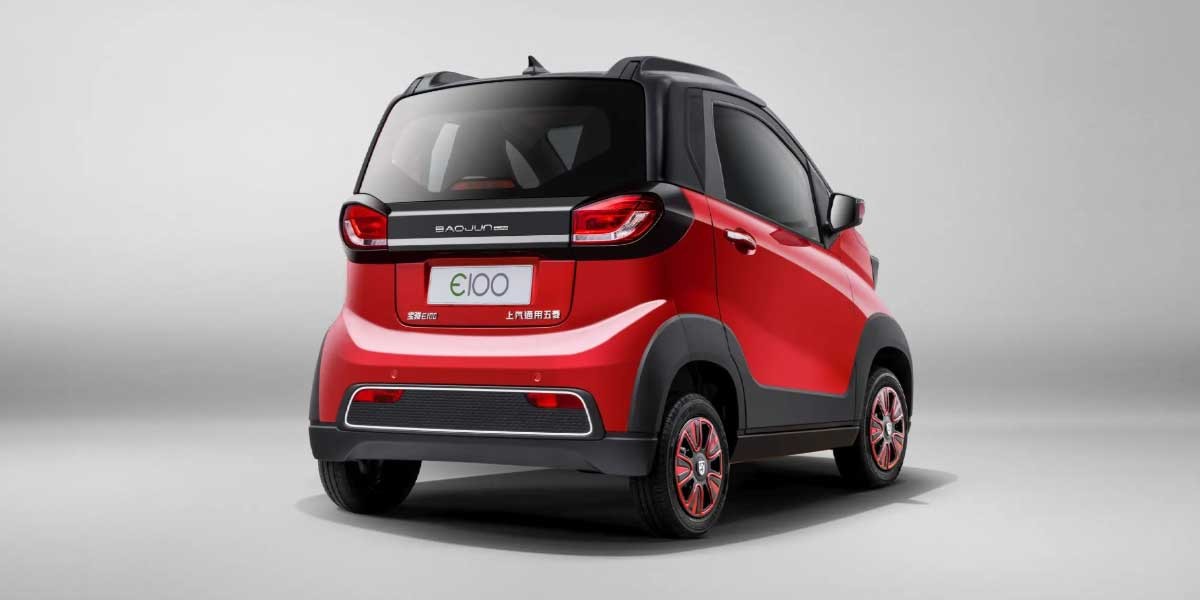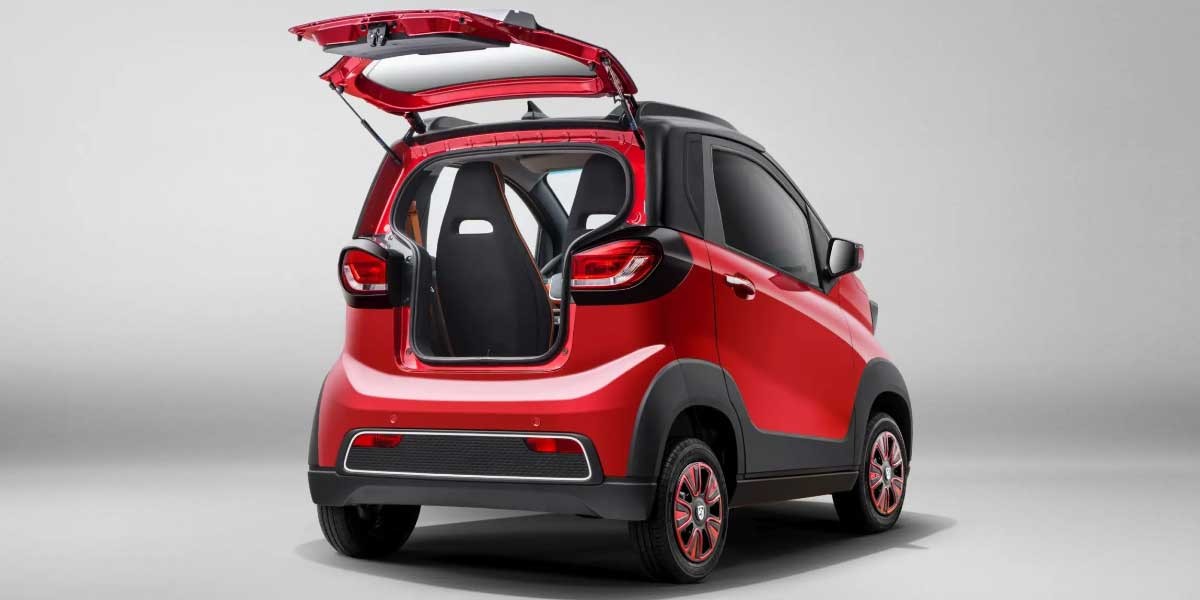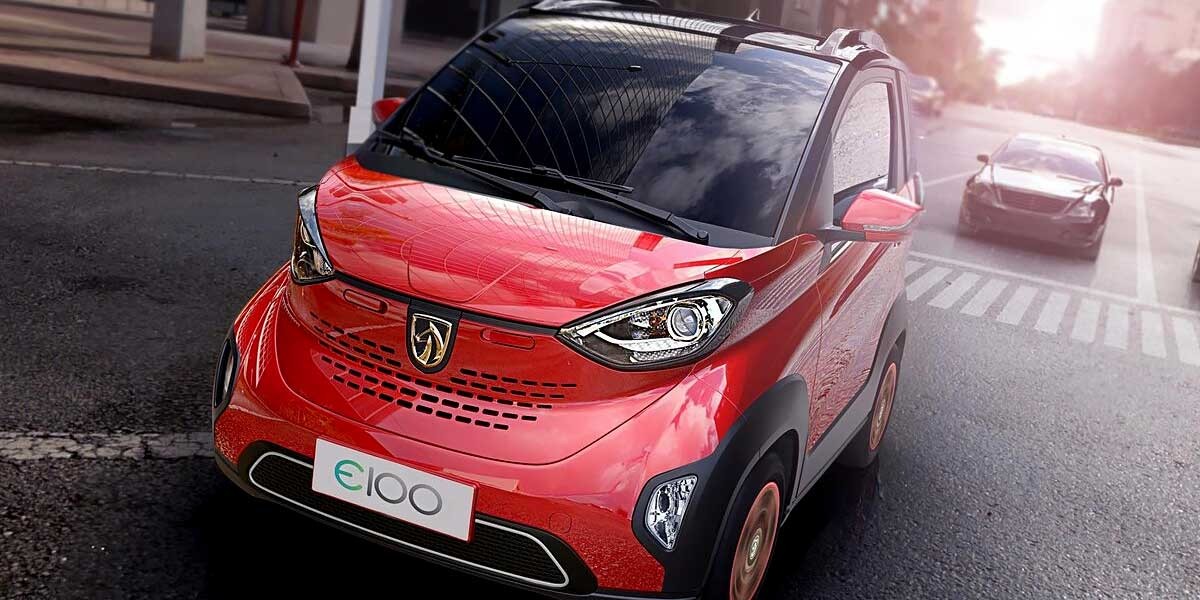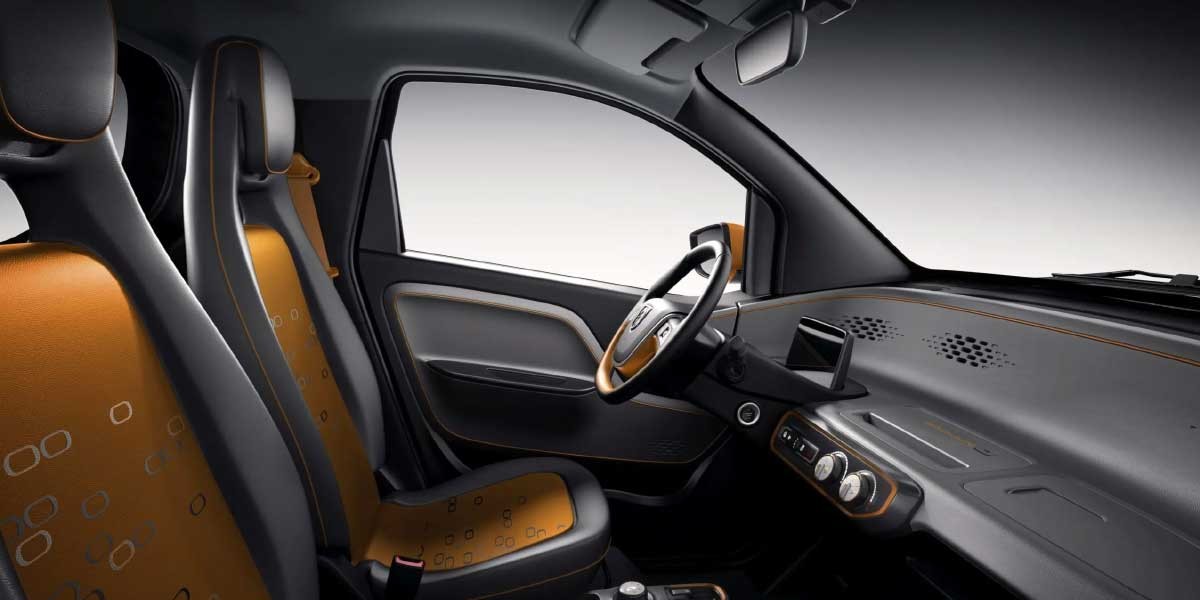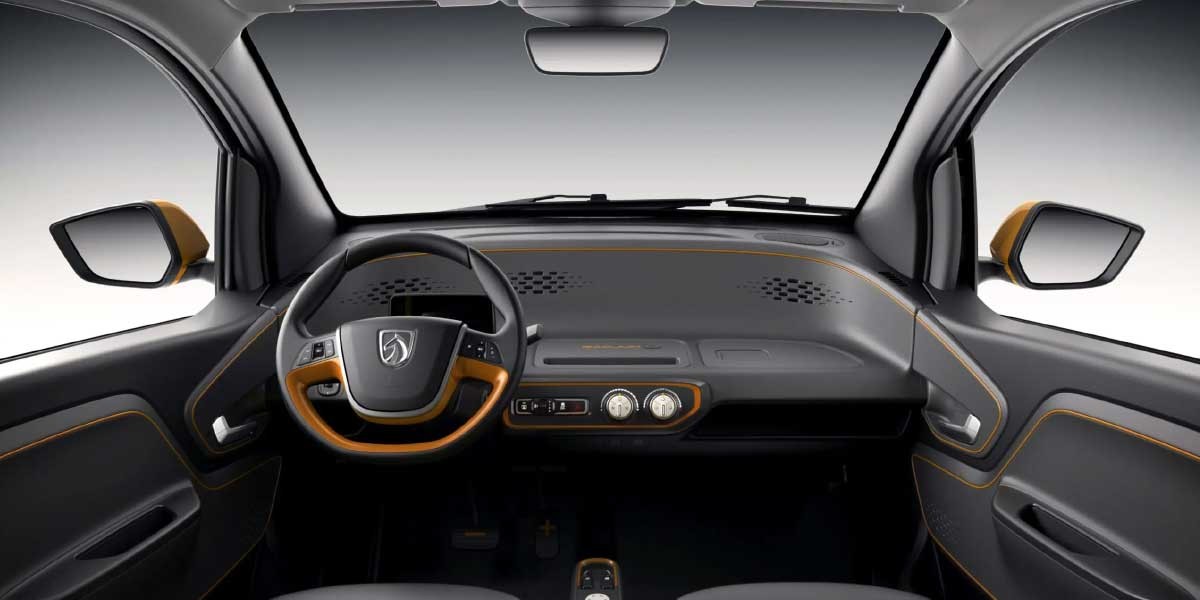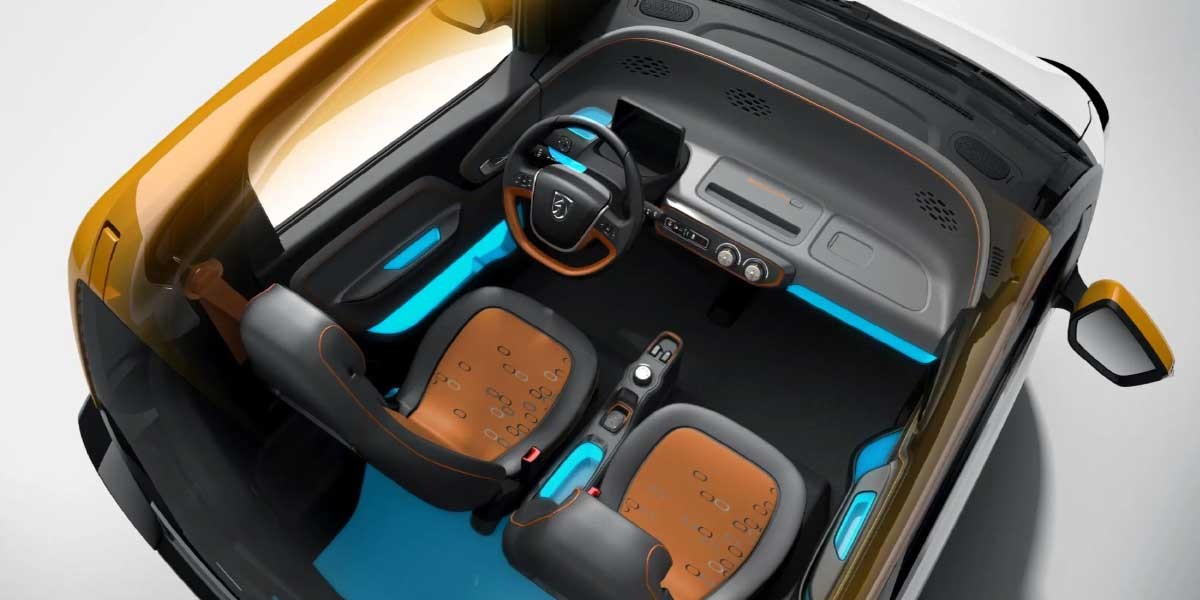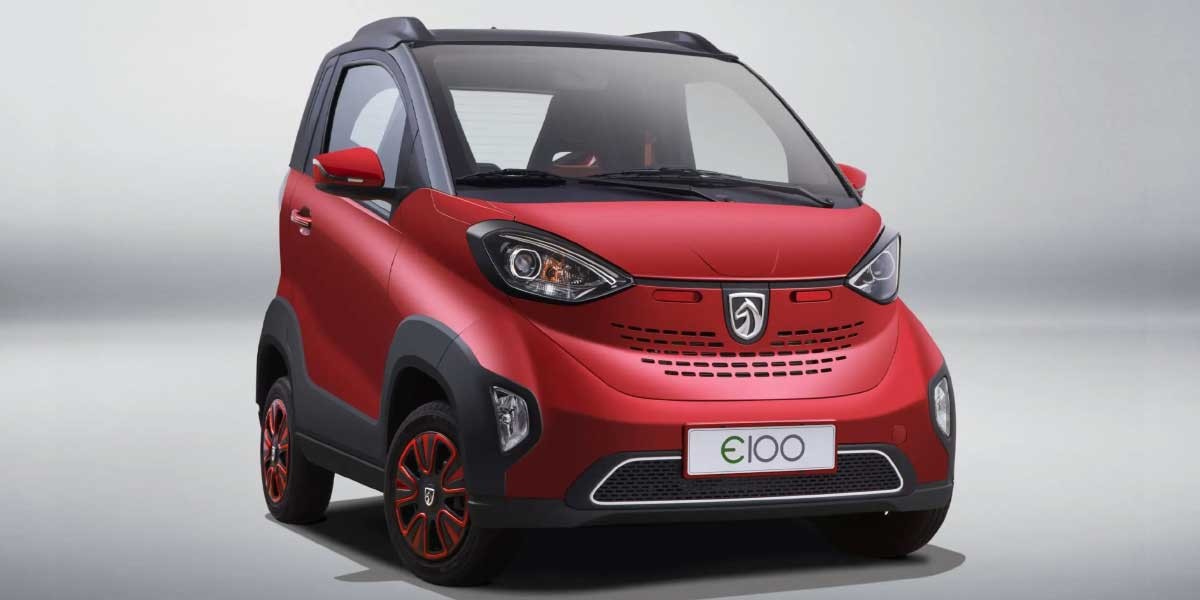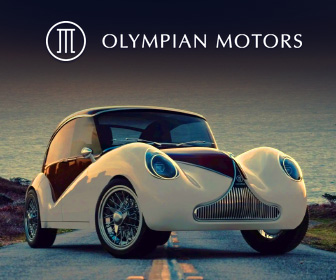Baojun E100
Baojun E100 is an electric microcar designed for urban commuting. It seats two, offers remarkable efficiency with a compact footprint, and provides a nifty solution for navigating crowded city streets.
User Rating: 4 / 5 (73 votes)





Base Trim Price: $8000 USD *
| Body Type | minicar |
| Model Year | 2020 |
| Manufactured in | China |
| Battery Capacity (kWh) | 28 |
| Electric range (km) | 305 |
| Max. Speed (km/h) | 100 |
| Acceleration 0-100 km/h (sec) | No data |
| Power (h.p.) | 39 |
| Drive Type | FWD |
* Minimum price set for the base trim by the manufacturer
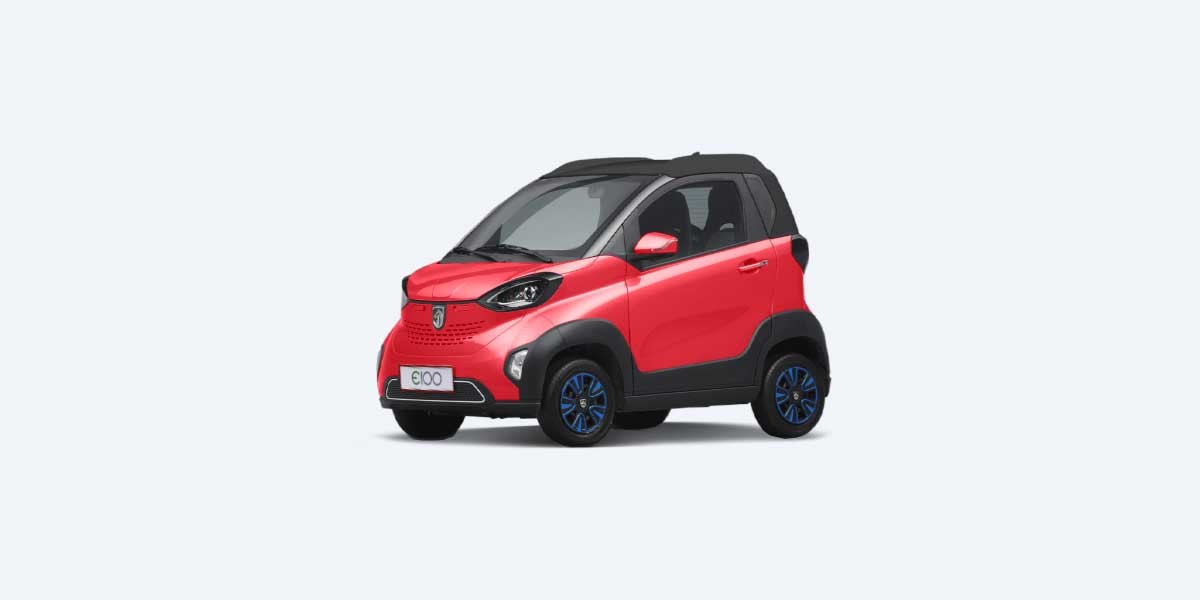
Baojun E100 Review
Baojun E100: A Green Marvel in Urban Transportation
Welcome to the dawning era of electric vehicular transport, where the Baojun E100 emerges as a nimble champion of city expeditions. Birthed from the collaborative genius of SAIC-GM-Wuling, under the moniker Baojun, the E100 first saw the limelight in 2017, immediately setting a new standard for what we should expect from urban mobility. As an epitome of efficiency clothed in an eco-friendly guise, this microcar not only challenges traditional notions of city commuting but also offers a tantalizing peek into a future where roads are ruled by the whispers of electricity.
Diving into the Baojun E100's World
The Baojun E100, with its compact allure, is ingeniously carved to cater to the pulsating heart of urban commotion. Its design—sharp, minimalistic, yet arrestingly modern—takes the form of a 3-door hatchback, cutting a distinct silhouette against the urban sprawl. Let's tunnel into the specifics that elevate this microcar to its pedestal of game-changing renown.
Electrified Heartbeat
At its core, the E100 thrives on an electric powertrain that boasts a 29 kW (39 PS) permanent magnet synchronous motor. This contraption isn't just a bland statistic; it translates to a spirited 39 horsepower (hp) and 110 Nm of torque, all funneled through a seamless single-speed transmission. The result? A drive as smooth as silk on a breezy day.
Commanding Energy Reservoir
With the Baojun E100, range anxiety is relegated to the annals of history. Thanks to its 14.9 kWh lithium-ion battery, this microcar unfurls an electric range tapestry of roughly 250 kilometers (155.3 miles). Whether zigzagging through daily errands or embarking on a miniature adventure, the E100 stands ready.
A Tardis on Wheels
Despite its outwardly petite dimensions, the Baojun E100 astonishes with an unexpectedly spacious interior. Sporting a wheelbase of 1,600 mm and stretching just 2,488 mm from nose to tail, it crafts an interior haven that comfortably accommodates two passengers, disproving the old adage that good things can only come in big packages.
Technological Armoury
The E100 doesn't skimp on safety or comfort, flaunting an independent front-wheel suspension and a single-arm rear suspension system. It's kitted with anti-lock brakes complemented by electronic brakeforce distribution, electric power steering, and an electronic parking brake. Negotiating the tight twists and turns of city driving becomes as effortless as a hot knife through butter, thanks to its 3.7 meters turning radius.
Evolutionary Leap
In 2018, the E100 witnessed a significant evolutionary leap, securing its spot at the zenith of microcar excellence. Let's unspool the threads of its improvements.
Range Renaissance
A seminal upgrade in 2018 was the extension of the E100's electric range. From an initial offer of 96 miles at its genesis in 2016, the range metamorphosed to an impressive 124 miles by June 2018, reinforcing the E100's credentials as the chariot of choice for urban warriors.
Diversified Elegance
The 2018 refresh introduced the market to two distinct flavors of the E100—Zhixing and Zhixiang. While the Zhixing variant wooed with subtle interior refinements, the Zhixiang variant upped the ante with luxuries like automatic folding mirrors and a parking camera, catering to a palette of tastes and needs.
Cost-Effective Nobility
Even with these evolutions, the Baojun E100 remained steadfastly anchored in affordability. Post-update, the Zhixing trim was pegged at RMB 46,800 ($7,257), and the Zhixiang trim at RMB 59,800 ($9,275) post-subsidies, presenting an offer too tempting for any urban commuter to overlook.
In the bustling corridors of micromobility, the Baojun E100 distinguishes itself as not just another cog in the wheel but as a harbinger of sustainable urban transport. Endowed with an electric heart, remarkable energy efficiency, and a thoughtful anatomical design, it heralds a compelling proposition for those navigating the urban jungle. As the 2018 updates further refine its allure and maintain its affordability, the E100 continues to ride high on the currents of the electric vehicle revolution, enticing adventurers to partake in the green odyssey thrumming on our doorstep.
Dare to venture beyond convention? The Baojun E100 beckons, not merely as a mode of transport, but as an icon of progress, waving the banner for the boundless potential of electric conveyance. Those poised to trailblaze into this verdant vista, behold: your chariot awaits.
Exterior and Interior photos of Baojun E100
Watch the Video Overview
Full Specifications List:
| Power | 39 hp (29 kW) |
| Range | 305 km (190 mi) |
| Max Speed | 100 km/h (62 mph) |
| Battery Capacity | 28 kWh |
| Price | $8,000 / €7,540 / £6,890 |
F.A.Q. about Baojun E100
What is the range of the Baojun E100 on a single charge?
The Baojun E100 has a range of approximately 305 kilometers (189.5 miles) on a single charge.
How long does it take to fully charge a Baojun E100?
Charging time details are typically provided by the manufacturer. It usually varies depending on the type of charger used.
What is the price of the Baojun E100?
The Baojun E100 is priced around $8000, which is approximately £6550 or €7530, depending on the current exchange rates.
What is the top speed of the Baojun E100?
The Baojun E100 has a top speed of 100 km/h (62 mph).
What is the total power output of the Baojun E100?
The Baojun E100 has a total power output of 39 horsepower (29 kW).
How does the acceleration of the Baojun E100 compare to other EVs?
Specific 0 to 100 km/h data is not available, but given its power, it may have slower acceleration compared to higher-powered EVs.
Can electric vehicles like the Baojun E100 be charged at any charging station?
Most electric vehicles can be charged at various types of charging stations, but it's important to confirm compatibility.
What is the battery capacity of the Baojun E100?
The Baojun E100 has a battery capacity of 28 kWh.
Are electric vehicles like the Baojun E100 more expensive than gasoline cars?
Electric vehicles can have a higher upfront cost but often have lower maintenance and fuel costs over time.
Where is the Baojun E100 manufactured?
The Baojun E100 is manufactured in China.
Comparison:
Let’s delve into the world of compact electrical vehicles and see how the Baojun E100 stacks up against its immediate competitors. Welcome to the clash of the mini titans: the Baojun E100, Smart EQ ForTwo, Renault Twizy, Citroën AMI, and Mitsubishi i-MiEV.
Range
The Baojun E100 offers an impressive range of about 305 km (190 miles) on a single charge. This is substantially higher when compared to the Smart EQ ForTwo, which manages only about 160 km (99 miles), and the Renault Twizy, which fondly peaks at a mere 100 km (62 miles). The Citroën AMI, with its 75 km (47 miles), feels more like a city insect than a road runner. The Mitsubishi i-MiEV isnt too shabby, cruising with a range of around 160 km (99 miles).
Acceleration
While official data for the 0 to 100 km/h sprint isn’t available for the Baojun E100, its competitors provide a bit more excitement—or lack thereof. The Smart EQ ForTwo hits 100 km/h in an agonizing 11.5 seconds, whereas the Renault Twizy has a more modest sprint of about 10.9 seconds to 80 km/h (50 mph). The Citroën AMI, bless its heart, clocks in around forever, and the Mitsubishi i-MiEV does it in a respectable 15 seconds. Clearly, none of these cars are designed for your everyday drag race but can manage city sprints with ease.
Power
The Baojun E100 churns out 39 horsepower. The Smart EQ ForTwo edges a tad with 82 horsepower, drawing a line between efficiency and power. The Renault Twizy brings 17 hp to the table, leaving you wondering if it should have been powered by hamsters. The Citroën AMI, meanwhile, is a meek 8 hp, a brilliant showcase of engineering minimalism. The Mitsubishi i-MiEV, despite its age, boasts a substantial 63 horsepower. Clearly, more power than muscle cars of the 1930s but less torque to impress todays gearheads.
Charging Time
In terms of recharging kinetics, the Baojun E100 hosts a 28 kWh battery, fully charging in approximately 8.5 hours on a regular outlet. The Smart EQ ForTwo and Mitsubishi i-MiEV, each with a slightly higher capacity, need about 7 hours. Then, the Renault Twizy whizzes up in just 3.5 hours. The Citroën AMI takes approximately 3 hours, an outstanding feat for a portable toy.
Price
Now, the wallet damage. The Baojun E100 is in a price league of its own at $8,000, £6,000, or €7,000, making it outrageously attainable. The Smart EQ ForTwo inflates to around $25,000, £18,500, €21,000. The Renault Twizy sits at $12,000, £10,000, €11,000. The Citroën AMI hovers at approximately $6,500, £5,000, €6,000. Finally, the venerable Mitsubishi i-MiEV shocks at around $23,000, £17,500, €19,500.
Overall, the Baojun E100 is a pragmatist’s delight, a techno-gremlin with a longer range, a decent charge time, and a price tag that doesn’t cost an arm and a leg. While others shed some pounds and horsepower, the E100 stands firm, making electric dreams accessible to us mere mortals.
